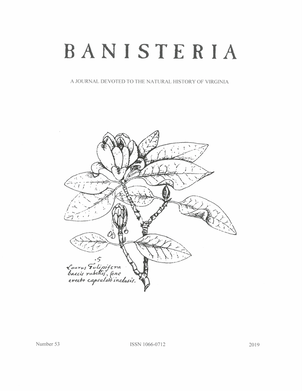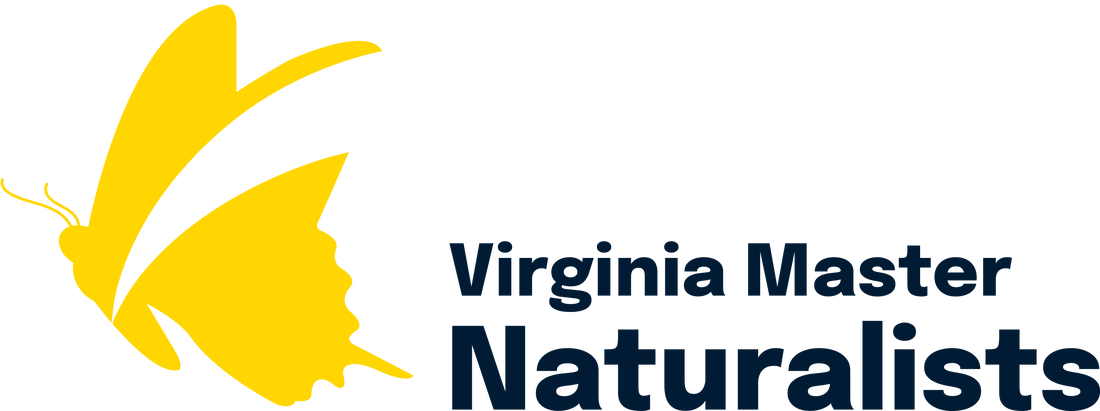 Banisteria is the journal of the Virginia Natural History Society.
Banisteria is the journal of the Virginia Natural History Society. The Virginia Natural History Society (VNHS) was formed in 1992 to bring together persons interested in the natural history of the Commonwealth of Virginia.
The VNHS defines natural history in a broad sense, from the study of plants, animals, and other organisms to the geology and ecology of the state, to the natural history of the native people who inhabit it. The goals of the VNHS are to promote research on the natural history of Virginia, educate the citizens of the Commonwealth on natural history topics, and to encourage the conservation of natural resources.
Share Your Citizen Science Results though the VNHS Journal
Dissemination of natural history information occurs through publication of the journal Banisteria, named for John Banister (1650-1692) who was the first university-trained naturalist to work in Virginia. The first issue was published in 1992, and the journal is published twice per year in spring and fall. Articles cover a wide array of subjects, and members of VNHS are encouraged to submit manuscripts on any aspect of natural history in Virginia; book reviews and biographies of relevance to natural history in Virginia are also welcomed. Manuscripts are peer-reviewed for suitability and edited for inclusion in the journal.
In the past, most submissions to Banisteria have been from authors in academia. VNHS would like to include a special section of the journal for citizen science projects which would provide a formal publication outlet for the results of the many projects carried out by members of the Virginia Master Naturalist chapters. Many chapters have projects which include long-term data sets that would likely be of interest to readership of Banisteria and would be a welcome addition to the literature dealing with the natural history of Virginia.
Papers submitted to the citizen science section would be expected to follow a similar format to regular papers with respect to journal style and would be subject to review and recommendations for revision by the editorial board. The editorial board of the journal will assist authors in the preparation of their papers with respect to both content and style.
Any comments or questions on this proposal for a special section from Master Naturalist chapters or individual members is welcome. Please contact the Editor, Todd Fredericksen, at [email protected].
You may visit the VNHS website at https://virginianaturalhistorysociety.com/index.html for information on the society and/or Banisteria.
Save the Date for the VNHS Annual Meeting
Virginia Master Naturalists are invited to attend the Annual Conference of the Virginia Natural History Society on Saturday, 31 October 2020 at Randolph-Macon College in Ashland, Virginia.
General Schedule
Student oral presentations and posters are welcome. Note that the number of slots for contributed oral presentations is limited. Registration will open in early September. Presenters must register and provide a title by 8 October. Please visit https://virginianaturalhistorysociety.com for updates.
The VNHS defines natural history in a broad sense, from the study of plants, animals, and other organisms to the geology and ecology of the state, to the natural history of the native people who inhabit it. The goals of the VNHS are to promote research on the natural history of Virginia, educate the citizens of the Commonwealth on natural history topics, and to encourage the conservation of natural resources.
Share Your Citizen Science Results though the VNHS Journal
Dissemination of natural history information occurs through publication of the journal Banisteria, named for John Banister (1650-1692) who was the first university-trained naturalist to work in Virginia. The first issue was published in 1992, and the journal is published twice per year in spring and fall. Articles cover a wide array of subjects, and members of VNHS are encouraged to submit manuscripts on any aspect of natural history in Virginia; book reviews and biographies of relevance to natural history in Virginia are also welcomed. Manuscripts are peer-reviewed for suitability and edited for inclusion in the journal.
In the past, most submissions to Banisteria have been from authors in academia. VNHS would like to include a special section of the journal for citizen science projects which would provide a formal publication outlet for the results of the many projects carried out by members of the Virginia Master Naturalist chapters. Many chapters have projects which include long-term data sets that would likely be of interest to readership of Banisteria and would be a welcome addition to the literature dealing with the natural history of Virginia.
Papers submitted to the citizen science section would be expected to follow a similar format to regular papers with respect to journal style and would be subject to review and recommendations for revision by the editorial board. The editorial board of the journal will assist authors in the preparation of their papers with respect to both content and style.
Any comments or questions on this proposal for a special section from Master Naturalist chapters or individual members is welcome. Please contact the Editor, Todd Fredericksen, at [email protected].
You may visit the VNHS website at https://virginianaturalhistorysociety.com/index.html for information on the society and/or Banisteria.
Save the Date for the VNHS Annual Meeting
Virginia Master Naturalists are invited to attend the Annual Conference of the Virginia Natural History Society on Saturday, 31 October 2020 at Randolph-Macon College in Ashland, Virginia.
General Schedule
- 9 AM to 10 AM refreshments, registration, and poster set-up
- 10 AM to 3:30 PM invited and contributed presentations and lunch
- 3:30 PM to 4 PM general members meeting
Student oral presentations and posters are welcome. Note that the number of slots for contributed oral presentations is limited. Registration will open in early September. Presenters must register and provide a title by 8 October. Please visit https://virginianaturalhistorysociety.com for updates.



 RSS Feed
RSS Feed